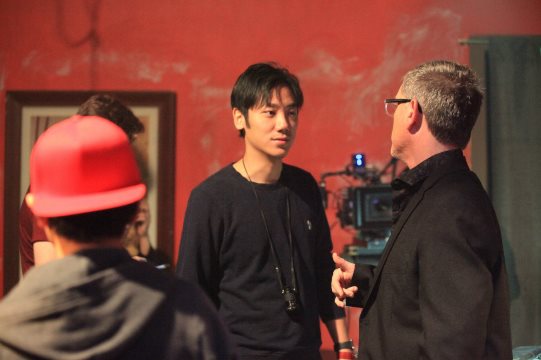Award winning Chinese emerging director Rui Cui
Chinese film market has grown to be one of the most lucrative markets in recent years. However, the average quality of the Chinese films barely satisfies its audience. The industrial leaders begin to think how to fuel this industry and bring more quality contents to the long-waited Chinese audience. Wang Sicong, founder of Banana Pictures and son of Dalian Wanda Group Chairman Wang Jianlin, gave out his answer – supporting emerging directors. Banana Pictures initiated a project which included a short film competition and several training programs to find brilliant young filmmakers and help them realize their ambitions. Rui Cui is one of the 16 directors that gain the appreciation from Banana Pictures. His film Free Choice won the second place in the short film competition.
Hailing from Beijing, Rui Cui was drawn to the creative pursuits at a young age. Equipped with a keen sensitivity to sound and image, Rui showed his talent for piano and painting when he was a child. Yet, after little Rui’s grandmother took him to the first cinema in Beijing for the first time, he could not ever looked away from that huge kaleidoscopic screen. He found his calling – films – to combine all his artistic enthusiasms together. Since then, the magic of films has never been lost on him.
Free Choice won multiple awards domestically and internationally before it shined in Banana Pictures’ short film competition. The story is set in the near future and follows four prisoners who choose to participate in a mysterious game of Russian roulette for a shot at freedom. Initially filmed in Rui’s second year at University of South California (USC), Free Choice was Film of the Year in China-US Film Festival of Young Cinema in 2017. It also won the best picture in Wonders International Film Festival.
Rui’s films vary across a wide range of genres and have earned him accolades. His comedy Father Knows Best won the Best Short Film at Canada International Film Festival. Musical Trista is distributed in Asia, the U.S. and Europe. Not only able to tackle genre films, Rui is also capable of directing quality artistic dramas. His thesis film To Pimp a Butterfly is exactly one of this kind, which has an impressive record of awards including Best Director in Global Shorts International Film, Opening Film in LA Shorts International Film Festivals and Best Short Film in California International Film Festival.
Rui attributes much of his versatility to the experiences at the School of Cinematic Arts (SCA) of USC. Working with the first-class filmmakers in Hollywood, such as Academy Award winners Mark Harris, Michael Fink, Stephen Flick and more, inspired Rui a lot.
“Evgeniy Lazarev starred in Free Choice. To me, he is not only a great teacher, but also a life mentor. He taught me many acting and directing skills and demonstrated what it means to be a professional in the film industry,” Rui also mentioned, “I had Bai Ling acting in my thesis film. She is a famous Chinese-American actress in Hollywood, and she had never acted in a student’s film before. Although a good script was the most important factor to engage her, a strong alumni network and USC’s brand itself gave me the chance to pitch my script to her first.”
Having gained so many great experiences and skills with the top artistists in the industry, Rui was titled the Top 10 Directors of SCA in three successive years. This recognition gave him huge confidence in the pursuit of his dream on a bigger stage.
Evgeniy Lazarev in Free Choice
All Rui’s films demonstrates a keen visual style – smooth moving shots, beautiful balance of light, and powerful composition. Rui is well versed in visual rhetoric. In To Pimp a Butterfly, Rui used clothes of different colors to illustrate the inner changes of the characters; he utilized a specific kind of flowers to indicate a bright future; he even symbolized Cheetos to express the close relationship between the brothers. He did not let go any detail in his film in order to depict a richer character or story.
“It always fascinates me to play with all the visual elements to facilitate the storytelling. The ability to swiftly sense and perceive those elements is probably something I was born with.” said Rui.
Raised in Beijing, Rui – who is fluent in both Manderin and English – received dual Bachelors in Digital Media Arts and TV Production from the Communication University of China. At the age of 20, he made the move to Los Angeles to gain exposture to the Hollywood way of filmmaking. By being raised in China and studying in the U.S., he has developed a global vision. He is very familiar and well connected with the film industries in both countries. Aside from filming shorts in both China and the U.S., he also actively participated in some U.S-China co-productions. More importantly, the multi-cultural experiences have influenced Rui to pay more attention to subjects like self-identity, culture, and belonging. It also draws a lot of Rui’s curiosity when he observes the subtle differences among different communities, while their similarities reflect the universal humanity.
“To me, every film is an artistic presentation of the real life, and they could shed light on the grey area that is usually ignored by us. A good film not only gives us a visual feast, but also encourages and challenges us to pay attention to some important issues or fundamental questions. For example, when I directed Free Choice, I wanted to deliver a message: no matter where you come from and what your background is, we all make concession to give up our freedom with or without conscious. And through To Pimp a Butterfly, I want to show diversity and acceptance, as well as the universal and eternal love from a mother. I keep looking for something that strikes a chord with the audience” said Rui.
Everyone that has worked with Rui describes him as an inspiring and diligent creator. They see him always holding a high standard for himself and his crew to achieve the best version of the film in his mind. He always believes it is a blessing to work with an ambitious and talented crew, and in return he assists everyone with his full capacity to realize their ideas in the project. People working with Rui have always been impressed by his dedication and passion.
“Working with Rui is assuring and challenging at the same time. Feeling assuring is because you know he is a director you can fully trust. He gives you clear instructions and constructive feedback to help you accomplish the goals. More importantly, his constantly comes up with new ideas to open up your mind and generates some sparks among different ideas. You feel being challenged all the time because Rui is a perfectionist, and mediocrity is not a thing he can accept. Until reaching his standards, he would not stop making you refine your work.” Said Guan Xi, cinematographer of To Pimp a Butterfly.”
Rui communicating with actors in To Pimp a butterfly
Rui’s ability of the visual storytelling and bold attempts to tell the local stories in a Hollywood or an industrialized way is what attract Banana Pictures. Wang Sicong, founder of the supporting program, knows exactly what Rui is capable of. The prosperity of this industry in China depends on artists like Rui, whom both masters the skills of filmmaking and understands the industry operations deeply. Banana Pictures has invested a huge amount of money and resources to provide the selected directors with platforms and privileges to create the films that Chinese audience waiting to see. It believes that young filmmakers are becoming the fresh blood and strong force to move this industry forward.
Rui and Wang Sicong
“There are too many rubbish films in the Chinese market. I don’t want to see them anymore, so I decided to open this company, training and nurturing new directors with the intention to change the status quo, ” Wang said.
The previous works brought Rui extensive praise, but Rui is ready to start a new chapter in his career as a director. Now Rui is preparing his first feature film, so let us look forward to seeing what this young artist will bring to the audience and the industry.














